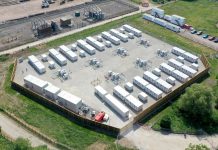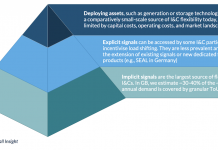
National Grid is working with platform providers in a bid to allow non-dispatchable sources of generation such as wind and solar into frequency response.
The system operator will run a trial next year to see if intermittent sources of power can help keep the UK power system stable.
The proposal is among a number published by National Grid as it moves to rationalise its suite of balancing tools in a bid to mitigate a increasing power grid volatility.
Firm Frequency Response (FFR) is one of the main tools used by National Grid to maintain system frequency around 50Hz.
The System Operator’s document says it will bring its procurement of FFR more closely in line with the wholesale market in terms of short-term and longer term tenders, as well as the ‘blocks’ of availability throughout the day that bidders can specify.
National Grid said it would also simplify FFR contracts, make its testing and compliance processes more suitable for new market entrants and review its exclusivity clauses, which will be welcomed by aggregators seeking to bid portfolios of flexibility into more than one place.
Enhanced Frequency Response
The System Operator also shed some light on its thoughts for a replacement Enhanced Frequency Response (EFR) product, which last year awarded contracts to battery providers that could provide sub-second response.
National Grid said it is now considering a split product – one that effectively ‘blasts’ faults for 60 seconds in order to contain them, followed if necessary by a secondary service required for up to 30 minutes.
National Grid said it plans to procure these faster acting response services “towards the back end of 2018, subject to further analysis and modelling”.
However, the SO underlined that the more fast acting services it provides, the less it may require other frequency services, which will affect revenues for current market participants.
STOR and fast reserve
National Grid also set out its plans for reserve products.
It will split out STOR products into those that can respond faster or slower than 20 minutes notice. For Fast Reserve, it will change its procurement to run different tenders for different time periods – and will no longer procure long term services until the impact of pan-European reserve services (TERRE and MARI) become clear. Those pan-European products could eventually replace some of the UK’s Balancing Mechanism and reserve services, said National Grid.
The System Operator said it is also working to implement a new dispatch platform for reserve services, much of which are currently manually instructed.
It will also apply the learnings from its close to real time FFR trial, which will run on a pay as clear, not pay as bid basis, to the reserve market.
National Grid said it would publish proposals around reactive power, black start and constraints in the first quarter of 2018.
See the document here.
Related stories:
National Grid confirms cull of frequency response products
National Grid plots major overhaul of balancing services with frequency response first to change
National Grid mulls rolling all frequency response services into one
Battery storage to cut FFR prices by 75%?
Battery storage: Where’s the smart money?
Free battery storage and DSR reports
Follow us at @EnergystMedia. For regular bulletins, sign up for the free newsletter.



